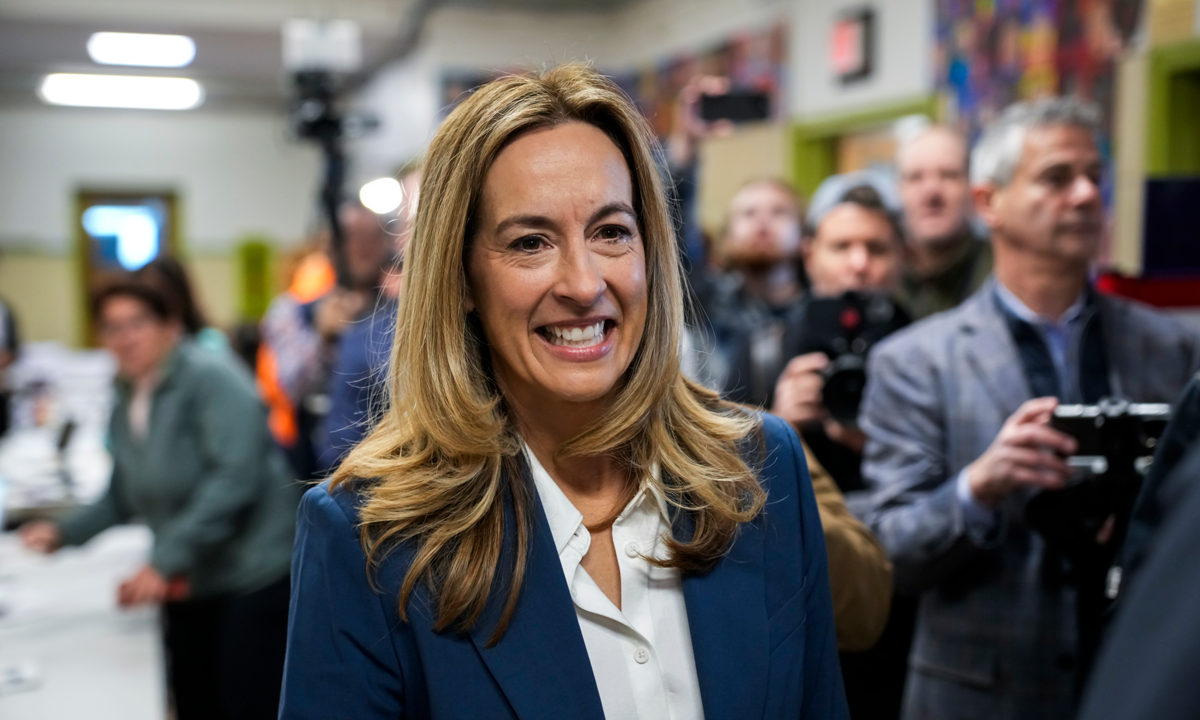
Spotlight on Montclair and West Windsor-Plainsboro
October 8, 2025
Sherrill, Gottheimer Slam NJEA’s ‘Violent, Antisemitic, Anti-Christian’ Social Media Posts
October 13, 2025Election2025: School Q&A With The Candidates
Ed. Note: USA TODAY Network New Jersey asked gubernatorial candidates Jack Ciattarelli and Mikie Sherrill to answer five questions on hot education topics: school funding, the role of the state in determining curricula, school segregation, learning loss suffered by students, and teacher shortages. Here are their answers.
How would you improve or change the way NJ provides funding to school districts?
Ciattarelli: “As governor, I would establish a statewide per-pupil spending cap or standard, allowing funds to ‘follow the student’ to public, charter or private schools via vouchers or educational savings accounts. I would shift full funding of special education from districts to the state, replacing the outdated census-based model, easing local burdens, especially in districts with higher-than-average needs, and addressing bipartisan concerns about the current system’s inequities. I would also loosen restrictions on interdistrict public school choice; grow charter schools; introduce vouchers modeled after Florida’s program, using public dollars for private tuition. Lastly, I would make state-funded pre-K means-tested and available statewide, not limited to select districts like Newark and Hoboken; require co-pays for higher-income families.”
Sherrill: “I believe we need to modernize the formula to reflect what an education should look like today, where we are meeting the latest standards and best practices, and helping students overcome challenges like learning loss and mental health. We need to ensure the school funding formula takes into account districts that have a higher percentage of students with special needs. The bulk of the current formula was written in 2008 and needs to be updated, but we are not starting from scratch. We also need to address some of the wild fluctuations and severe cuts we are seeing year to year now that we are actually fully funding and administering the formula — this can happen to any district, and it can be very disruptive to school operations, staffing levels and the quality of education a student receives year to year.”

What role does NJ state government have in determining school curricula?
Ciattarelli: “Of course, the governor and the Legislature should have input, but they cannot and should not dictate to local districts and try to cut parents out of the loop … I would mandate age-appropriate sexual/social education; repeal Policy 5756; post K-12 curricula online; implement a ‘Parents’ Bill of Rights’ for transparency so that parents are deeply involved and informed, not told things on a ‘need to know’ basis about their own child.”
Sherrill: “The state has a role to play in setting broad academic standards — so that whether a child grows up in Newark, Paterson, Cherry Hill or Cape May, they can graduate with the skills they need to succeed in college, in the workforce, and as citizens … At the same time, I firmly believe that individual districts should have flexibility in implementing those standards. Teachers and local school leaders know their students best. They understand the needs of their communities, and they should be trusted to tailor lessons, choose materials, and innovate in ways that make learning engaging and relevant.”
Where do you stand on the ongoing school segregation lawsuit?
Ciattarelli: “The solution is not to force parents to send their children to public schools outside of their hometown … As governor, I will immediately do four things: 1) lift the state freeze on the Interdistrict School Choice program to allow parents real choices in the schools their children attend, starting with the more than 2,000 students currently on its waiting list; 2) implement a high-impact curriculum that gets students on grade level in the shortest possible time; 3) create more magnet schools, regional charter schools and vocational-technical schools statewide; and 4) reform the state’s school funding formula that sets a statewide standard on per-pupil spending and allows money to follow the student. These specific reforms will create accountability, alleviate educational imbalances and improve public education statewide.”
Sherrill: “I am disappointed that the parties have not been able to resolve the matter through mediation. It will be incumbent on the next governor to implement any remedy that may be ordered by the court. But regardless of the outcome, I believe that part of the solution should include new regional magnet schools that enroll a diverse group of students from both urban and suburban communities … we should also explore expanding some existing programs to address segregation, including our vocational schools and the Interdistrict Public School Choice Program, which allows students to enroll in a different public school district that better meets their needs.”
What would you do to help students who are suffering from learning loss?
Ciattarelli: “Unnecessarily long school closures and the resulting prolonged period of ineffective remote instruction directly led to significant declines in student achievement … To reverse this trend, we need a high-impact curriculum to get our kids back on grade level in reading, writing and math. That’ll happen when I’m governor. This directly ties the concept to combating learning loss by emphasizing a focused, effective curriculum to recover academic ground.”
Sherrill: “As a mother of four children who were in elementary, middle and high school during the pandemic, I’ve seen how COVID impacted our kids’ learning and could hold them back in college and their careers. In New Jersey, students are still behind where they were in 2019 and need more support to catch up. As governor, I’ll expand access to high-impact tutoring in our schools, which is proven to boost academic achievement and get kids back on grade level. I’ll also boost mental health support programs for our students and direct resources to ensure that kids are at grade level for literacy by third grade — a key benchmark for their future success in school and the workforce.”
What should be done to ensure NJ addresses its teacher shortage?
Ciattarelli: “We can make the profession attractive again by: 1) assuring teachers that their salaries, pension and health benefits will be adequately funded and provide for a secure middle-class standard of living; 2) fixing the state health insurance plan and, if necessary, reforming Chapter 78 to ensure that public workers do not experience a decrease in net pay due to required employee contributions; and 3) guaranteeing that the public school curriculum will be focused on critical life skills, and not sensitive subject matter that belongs at home.”
Sherrill: “I will expand pipelines for our educator workforce, including apprenticeship programs that have shown promise in giving pathways towards certification for classroom aides, paraprofessionals, tutors and long-term substitutes. I will remove barriers to joining the profession, like expanding stipends to student-teachers, who cannot afford to go a semester without earning an income. I will work with our teacher preparation programs at our colleges and collaborate on innovative ways we can recruit students into the profession. And lastly, I will improve retention by empowering teachers and providing more resources for them to do the challenging work that we ask of them.”



